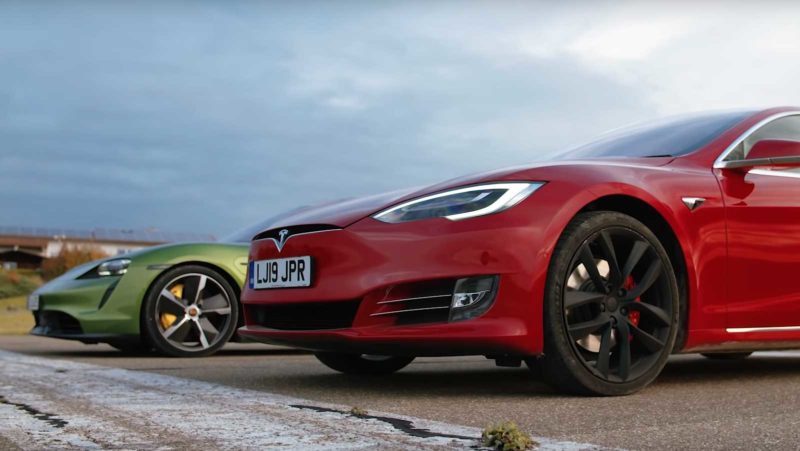Tesla CEO and co-founder Elon Musk has entered the controversy over a Top Gear video that claims to show that a Tesla Model S was outgunned by an electric Porsche Taycan in a drag race.
The comments from Musk were made in relation to a Top Gear video that has been called out as fake news by drag racing expert Brooks of YouTube channel DragTimes, who questioned the numbers used by Top Gear.
He accused Top Gear – which has never been much of a fan of electric vehicles – grabbed numbers for the Model S from a previous drag race, and Musk entered the debate saying: “Sorry, Drag Times is correct, Top Gear is wrong“.
Musk added that with the next software upgrade to Model S adding another 50 horsepower (36.8kW), it will easily beat the Porsche Taycan in both a 0-60mph dash and a quarter mile drag race.
Drag Race Times analysis is correct. Also, there’s a software upgrade for Model S coming out that increases peak power by 50HP, so Model S should beat Porsche Taycan Turbo S by a wider margin in 0 to 60 & 1/4 mile races.
— Treelon (@elonmusk) October 31, 2019
For those that don’t remember, the launch of Porsche’s first electric vehicle, the Taycan sportscar, in September sparked a sort of contest between the pioneering Californian EV maker and German sportscar mainstay Porsche.
Just a day after Porsche launched the Taycan (which it said had a ran a record production car lap time at the Nürburgring Nordschleife), Musk appeared to challenge Porsche stating that Tesla would take a Model S on a run around the notorious road test track.
While the souped-up, tri-motor “Plaid” Model S that subsequently beat the Taycan’s time was not a production version of the flagship Tesla vehicle (yet), the question of which of the two vehicles is the quickest or fastest has become an attention-grabbing topic.
Top Gear claims that in the recent drag race, the Tesla Model S achieved a speed of 0-60mph (0-96.5km/hr) in 2.68 seconds, 0-100mph (0-160.9km/hr) in 6.46 seconds and a quarter mile (402m) dash in 11.08 seconds.

But it would appear that this is the exact same time achieved by a Model S two years ago, as numbers forwarded to Brooks following the 2019 drag race show that the new video actually uses figures from a 2017 drag race between an early model P100D Model S and a Mercedes AMG E63 that you can watch here.
As Brooks points out, no drag race ever has the exact same results (and if this did in fact happen, it would be a very very slim chance).

Top Gear has responded by saying that while it did use the numbers from the 2017 race, this is because they are fastest times they have on record for the Model S.
According to a blog post published by the UK auto show today:
First things first, we ran the drag race five times and the Porsche won every time by a small but increasing margin with each subsequent race.
The best figures we recorded for the Taycan Turbo S were:
0-60: 2.61
0-100: 6.12
¼ mile: 10.69s @ 131.6mph
The best figures we recorded for the Tesla Model S Performance were:
0-60: 2.83
0-100: 6.64
¼ mile: 11.23s @ 123.2mph
The numbers we posted in the video for the Tesla were:
0-60: 2.68
0-100: 6.46
¼ mile: 11.08s @ 124.0mph
These were numbers we recorded in a Model S on a previous occasion. We ran them because these are the best figures we’ve achieved in a Model S to date so we know that’s what the car is capable of.
And just to be clear, the Tesla was in Ludicrous+ mode, the battery was pre-conditioned and both cars had around 85 per cent charge before the first run.
This is isn’t however the first time the British auto show has been accused of fabricating stories about electric vehicles.
In 2011, Tesla took Top Gear to court over allegations that the auto show had deliberately misconstrued the range of its electric Roadster sportscar, suggesting that the Roadster – that was supposed to have a range of up to 211 miles (339km) – ran out of charge after 55 miles (88km).
That same year, the auto show was accused of faking a story about the Nissan Leaf’s range, running the battery down to 40% so that it could stage a breakdown. This was later debunked by the Leaf’s own battery monitoring software, attracting a great deal of media attention resulting in the BBC pulling the episode from its website.
This debunked claim was still used by Australia’s energy minister Angus Taylor to try and manipulate Australian public opinion against electric vehicles in the lead up to the recent Australian federal election.

Bridie Schmidt is associate editor for The Driven, sister site of Renew Economy. She has been writing about electric vehicles since 2018, and has a keen interest in the role that zero-emissions transport has to play in sustainability. She has participated in podcasts such as Download This Show with Marc Fennell and Shirtloads of Science with Karl Kruszelnicki and is co-organiser of the Northern Rivers Electric Vehicle Forum. Bridie also owns a Tesla Model Y and has it available for hire on evee.com.au.

